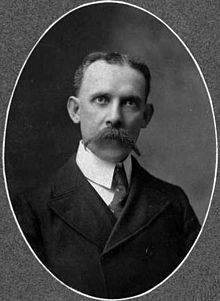Francis Preston Venable
Francis Preston Venable (born November 17, 1856 in Farmville (Virginia) , † March 17, 1934 in Chapel Hill , North Carolina ) was an American chemist.
The son of the math professor (and former staff officer of Robert E. Lee ) Charles Scott Venable (1827-1900) studied from 1874 at the University of Virginia in Charlottesville, was briefly a teacher in New Orleans and continued studying chemistry from 1879 in Bonn and 1881 in Göttingen, where he received his doctorate in 1881. He was then a professor at the University of North Carolina at Chapel Hill. In 1930 he retired. From 1900 to 1914 he let the professorship rest when he was university president.
He dealt with the chemistry of zirconium , processes during the hydrolysis of inorganic compounds and, most recently, with radioactive substances. He also gave lectures on the history of chemistry. He played a role in the discovery of the industrial uses of acetylene . This was the result of the attempts by Thomas Willson and the industrialist James Turner Morehead to produce aluminum with an electric arc (in the form of its calcium salt, calcium carbide). The two consulted Venable for the analysis, who recognized that there was a reaction already described by Friedrich Wöhler in 1862.
He was a Fellow of the Chemical Society of London and the American Association for the Advancement of Science . In 1905 he became president of the American Chemical Society.
One of his students was John Motley Morehead III , the founder of Union Carbide .
Fonts
- A Course in Qualitative Chemical Analysis. 1883
- A short history of chemistry. 1894
- The development of the periodic law. 1896
- with Howe: Inorganic Chemistry. According to the Periodic Law. 1898
- Study of the Atom. 1904
- A brief account of radio activity. 1917
- Zirconium and its Compounds. 1922
literature
- Winfried Pötsch u. a .: Lexicon of important chemists . Harri Deutsch, 1989
Individual evidence
- ↑ Derek Lowe, Das Chemiebuch, Librero 2017, p. 198
| personal data | |
|---|---|
| SURNAME | Venable, Francis Preston |
| BRIEF DESCRIPTION | American chemist |
| DATE OF BIRTH | November 17, 1856 |
| PLACE OF BIRTH | Farmville, Virginia |
| DATE OF DEATH | March 17, 1934 |
| Place of death | Chapel Hill |
